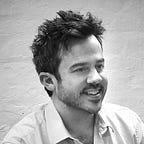We are becoming distracted by the wrong ‘R’.
I got distracted recently, as I left our local recycling centre.
I had just dropped off the-now-regular carload of cardboard, and I was feeling good. It was a contribution to the recycling effort. Our cardboard was going back into the virtuous cycle of recreation, to be reborn again as another box, or something else. Maybe a napkin, or a bag.
As I was leaving the recycling centre, I then passed by the drop off station for out of hours recycling. Many of us have these locally. They are often a corner of a supermarket car park, or a square of concrete, decorated with large wheeled bins dedicated to cardboard, or glass, or tins.
You arrive in your car, find the correct bin, and drop off your recycling.
The difference this time that caught my attention was that you could barely see the wheeled bins. Where they would usually stand proud and alone, they were becoming buried under a mountain of cardboard.
It was piled in the gaps. Wedged into any cracks. Strewn across the floor.
It stopped me in my tracks. Any feeling of joy I had, evaporated.
I started to wonder, if we are too focused on the wrong ‘R’.
That we’ve become obsessed with recycling as the most important difference we can make to our planet, and that it has become a distraction.
It is easy for this to happen, because distraction is very close to inspiration.
The difference is what it makes you feel, and do.
If it creates momentum. Gives you energy. Creates a feeling that you can’t help but act, then it is likely to be inspiration. It is the positive energy of a possible goal, and a way to achieve it. It is the simple ideas of others, given as a relatable gift.
Recycling feels inspirational. Social media tells us stories of great feats of recycling. That person who cleaned the whole beach by themselves. That start-up who is turning what we throw away into something virtuous and useful.
Distractions can start there, but then can become the master of disguise.
As their light begins to shine brighter, inspiration becomes distraction when it loses the positive energy with which it began. When it stops moving us forwards, and instead becomes just a shiny light, that draws us simply because it is bright.
Distractions stop us from thinking. They become a mindless obligation or an easy excuse, and we forget to think about why we are still doing it.
Should we celebrate the person who cleans the beach? Shouldn’t we be angry and concentrate on stopping those who wreck it in the first place? Do we need our waste to provide endless resource for new gadgets, without wondering instead how to stop the flow of raw material supply?
There is inspiration everywhere. There is distraction everywhere. It is different for us all.
And for me, recycling is beginning to be a light that blinds us.
It is still good. It makes a difference. Making sure that as little as possible ends up in trash, that does not need to be there, is something to be proud of.
But the thing that recycling is starting to distract us from, is whether we need to consume the thing in the first place.
Or whether we should skip it this time. Or stop.
Recycling is at risk at blinding us from thinking too much about the click-to-buy, because once we’ve ripped the packaging open, it can be recycled. That it is OK to swap, because that disposable item is made of bamboo now.
That it is OK to keep consuming, because whatever we are using, or eating, or wearing, is now ‘from sustainable sources’.
We can apply the balm of recycling, and crack on.
The trouble is, that the planet cannot keep up. It is not enough to keep producing things, and then sending back part of what we have consumed to be used again.
It is creating another industry on top of industries, on top of industries.
It keeps feeding our desire for mass consumption, and distracting us from the fact that it is mass consumption that is destroying our planet.
There is the risk that too much focus on recycling, switches one problem for another. It moves resources from one place to another, but does not fix the fundamental issue that we consume too much, or at least do not think about what we consume.
It means that perhaps another R is more important: reduction.
Pause, and wonder before we consume something, whether we need it at all. Simplify our lives, and edit out things that we don’t need.
Find happiness in a more simple way of living. Not through aggressive minimalism or frugality, but through small changes that keep the pleasure in our lives but connect us more to the planet.
And continuously.
Continuously wonder about what we’re buying, and where it came from. Persistently wonder about what we’re eating, and how it might have reached our plate, whatever it is.
We absolutely need innovative ways of recycling what we have produced. Up to now.
But as individuals we also need to stop, and think again about why we’re consuming.
Our planet is a masterpiece. It is a wonderful and privileged place to be.
And a masterpiece can only be created with energy, care, and love.
With inspiration, not distraction.
####
If you enjoyed reading this article, then you can find the latest compilation of the Planetwise Diaries up-to-now as an ebook here:
